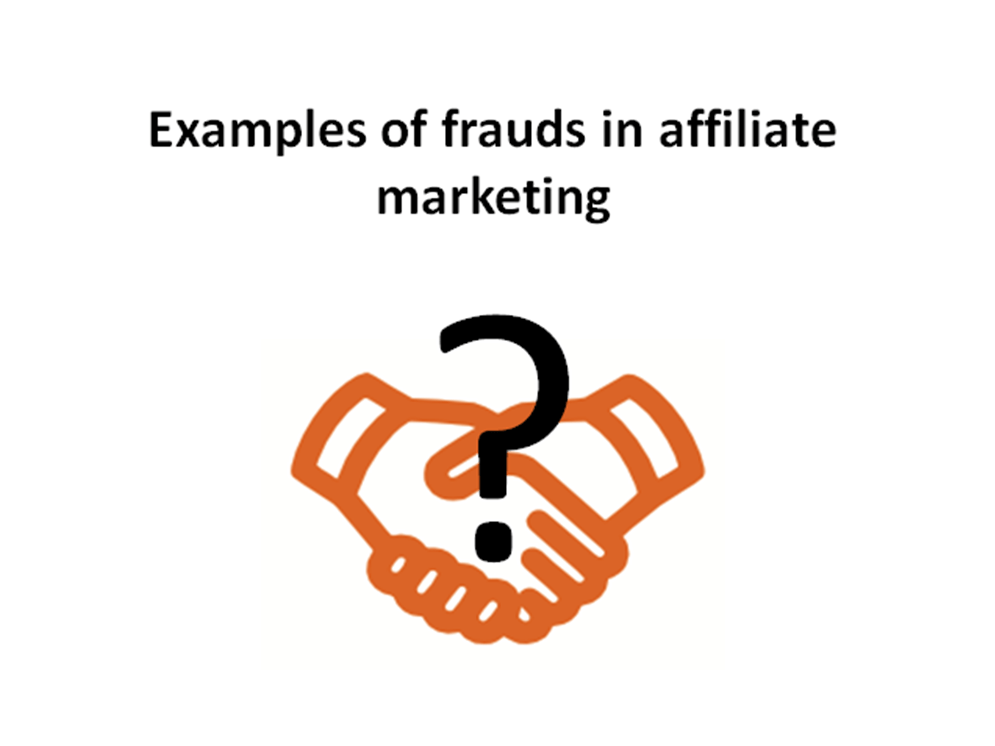Examples of frauds in affiliate marketing

source: own elaboration
Affiliate marketing was created to help advertisers find the right partners to effectively promote their products and services. Unfortunately, for several years we have been observing a steady increase in the number of dishonest publishers, i.e. fraudsters who want to trick entrepreneurs who want to advertise using the Internet. Below we discuss examples of frauds commonly found in affiliate marketing.
Settlement models
In affiliate marketing, it is the advertiser who decides what he wants to settle with publishers for. Depending on the assumptions of a given campaign and the desired effect, he can pay for the click obtained for him - CPC, lead (i.e. contact details of a potential customer) - CPL, 1000 ad impressions - CPM, sales – CPS, application download or any other activity performed by user - CPA. You can also use hybrid models combining several of the following proposals, e.g. CPC + CPL, CPL + CPS, etc. Although the billing model may be key when it comes to the effectiveness of given affiliate activities and their translation into the company's profit, unfortunately it doesn’t mean that any of them can fully protect the advertiser from affiliate fraud.
What are advertisers who use CPC and CPM models at risk?
In campaigns billed per click or per 1000 impressions, ad frauds are unfortunately a common phenomenon. The greatest threat here are artificial clicks and views generated by BOTs, i.e. automated computer programs that "fake" user's clicks. The most advanced ones can efficiently simulate human behavior on the page (cursor movement, touching the screen, scrolling, etc.), which makes their detection much more difficult.
But click fraud doesn’t have to mean that BOT is behind the fraud - fraudulent clicks or views on a large scale also produce click farms, and specifically their employees, often very modestly paid. Of course, fraudsters use solutions that dynamically change IP addresses, thanks to which the given activity isn’t counted as a duplicate.
Another method used by rogue publishers is to generate clicks and impressions without the device owner’s knowledge. This can happen on certain websites - when a user browses the content of that website, other pages run in the background, and often fraud clicks are generated.
How leads are counterfeit?
Ad frauds have also become the everyday life of advertisers using lead billing (CPL) models. First of all, fraudsters can use the same data in many campaigns - of course, most often without obtaining the appropriate consent from the data subjects. Such fraud is called multiplication - information from one contact form is automatically copied to others. The information provided is real, so it isn’t classified as incorrect, but most often it will be completely useless for the advertiser - it doesn’t belong to people who are really interested in the offer. What is worse, handling such leads can end up very unpleasant – because the data subjects haven’t agreed to be contacted by the advertiser.
Another way to cheat with CPL is to fill in forms with incorrect data, hoping it won’t be verified. Although they aren’t too sophisticated frauds, they can turn out to be very expensive for the advertiser (for example, the cost of handling a lead by a call center, sending a message, etc.), if they aren’t detected in time.
We have also been observing frauds related to call center frauds for some time. Their task is not only to create fake leads, but also to handle them. People employed there answer incoming calls from advertisers and pretend to be interested in the offer.
Everything can be forged - even sales. Fraud in CPS and CPA campaigns.
Sometimes a fraudulent publisher with a small call center goes a step further and generates false sales in addition to leads. The person makes a purchase and then resigns from the service or returns the product. All this so that sales are counted on the fraudster's account. A similar fraud can be made in the case of most activities settled in the CPA system, such as application download.
Another way to cheat an advertiser in the CPS or CPA model is cookie stuffing. A cookie is a small piece of code that is added to the user's browser to collect data about his history, preferences, etc. In the affiliate industry, they are also used to "track" publishers who are entitled to a commission for a given conversion. Cookie Stuffing and Cookie Dropping are marketing scams where users are tossed with a fraudulent publisher's cookies, so that the sale is assigned to him, and not to the publisher who actually contributed to the purchase.
Does this mean advertisers should opt out of affiliate marketing?
Absolutely not. Well-conducted affiliate activities can be a key element of your marketing strategy and bring very satisfactory results. However, it is worth increasing the efficiency of this type of marketing activity through the parallel use of preventive solutions. We already have companies on the market that specialize in ad fraud protection - such as trafficwatchdog.pl - which will certainly propose the best method of fighting fraud for a given business.

